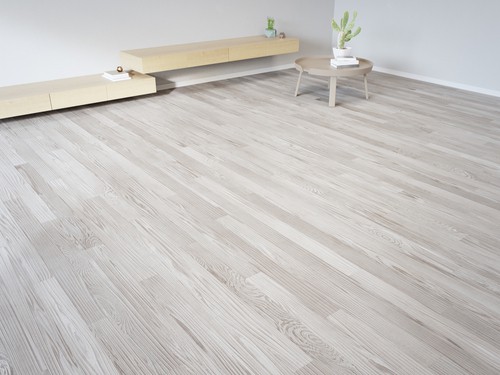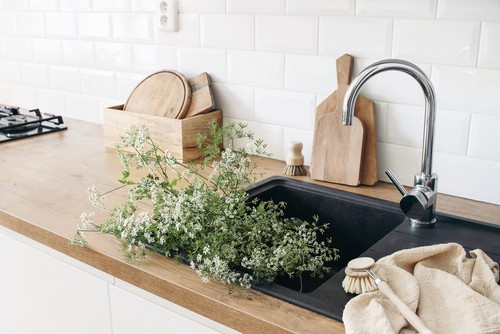
Industrial Home Interior Design
September 20, 2022
Popular Flooring Options In Singapore
November 2, 2022Laminate Flooring vs Vinyl Flooring

Laminate Flooring vs Vinyl Flooring. If you’re currently in the market for new flooring or looking to upgrade the flooring in your home, you may have encountered two options that often confuse customers: laminates and vinyl. Laminates are often confused with vinyl because they come in textured, smooth, patterned designs.
However, there are critical differences between these two types of flooring, which can make one more desirable than the other. The key aspects between Laminate Flooring and Vinyl Flooring, which should be a deciding factor in what type of flooring you choose, include the following:
Factors In Choosing What Type Of Flooring

Design
Laminate
Laminate floors consist of multiple layers of fabric backed by a layer of plastic on top (a motif commonly found on wood products). That means the surface is not glued down but relies instead on pressure from the different layers underneath for durability and strength. Laminate flooring also comes in wide and varied styles that appeal to your home.
Vinyl
Vinyl flooring is made of layers of plastic with a surface design (in the form of tiles or sheets) that gives it a wood-like appearance. However, it is stuck down rather than relying on pressure from the layers underneath, making it more durable and less likely to peel up. Because it is plastic, vinyl flooring also has non-skid properties making it safer to use since you don’t have to worry about slipping and falling when you walk on it.
Appearance
Vinyl
Vinyl floors have an aged look that many people enjoy for its “vintage style” appeal. Laminate floors have a similar appearance to vinyl, but it is a more recent innovation in flooring.
Laminate
Laminate flooring results from years and years of research attempting to make laminates look more visually appealing. In the end, the laminate process doesn’t quite have the “aging” vinyl has.
Installation process

Laminate
Laminate flooring is effortless to install because each piece is held together by pressure pins that hold it in place. Because you don’t need a sink or a compressor, Laminate flooring installs quickly and can be put in as soon as the paper package arrives. On top of that, many people find laminate flooring aesthetically appealing, making it a safe choice for decorating.
Vinyl
The most notable disadvantage of vinyl flooring is that you must use a ‘floor sealer’ when installing the vinyl underlayment to cover the gaps from which particles, humidity, and moisture can seep through. That increases the overall cost of the floor and requires you to wait for the sealer to dry before you can install the vinyl tiles.
Durability
Laminate
Laminate floors are not as strong as some other wood floors, but they can still be durable. Lifespans are usually dependent on a few factors, including whether or not your laminate floor is installed in a high-traffic area and how well it is cleaned/cared for.
Vinyl
Vinyl flooring will last a very long time, providing years of use if properly maintained. One of the reasons vinyl flooring lasts so long is because it is cleaned and cared for with a special type of cleaning product.
Repairs
Laminate
Laminate floors can be repaired, but not as easily or effectively as vinyl. The lack of a coating over the core material makes repairs challenging to do over time, which is why laminate flooring has a reputation for holding up for ten years or more.
Vinyl
Vinyl flooring can be easily repaired, which is why it holds up better when it comes to repairing scratches and cuts down on costs in the long run.
Comfort on Different Floors
Vinyl
Vinyl sheet flooring is softer to walk on than hardwood, stone, or ceramic tile because it comes in layers that include padding, making it ideal for wood subfloors and radiant heat systems. Also, many vinyl floors offer extra padding for a cozier feel.
Laminate
Laminate flooring is made of layers of wood and other materials and tends to be less comfortable to walk on than hardwood, stone, or ceramic tile. However, laminate floors can be customized with a textured layer to make them feel softer.
Moisture Resistance
According to experts, the quicker the water evaporates after it has been applied to a surface, the better it can resist moisture. Due to this fact, vinyl floors have much more water resistance than laminate floors, making them ideal for kitchens and bathrooms where there is often moisture present daily.
Similarities Of Laminate Flooring and Vinyl Flooring

Wide Variety of Colors and Designs
Vinyl and laminate flooring comes in a broad spectrum of colors, textures, and styles. The number of choices for each type is almost equal. Both floors can be found in porcelain, tile, and wood-like finishes. In the past, the selection of laminate flooring was limited by technology, but with modern machinery, you can find laminate floors that have the depth and texture of natural hardwood or stone with a variety of color options.
Cleaning
Laminate and vinyl flooring are easy to clean with a broom, vacuum, or damp mop. Scratch-resistant laminate can be dusted and mopped like ceramic tile. You can clean vinyl floors by sweeping, but you might need to use a vacuum to get rid of the dirt trapped in the floor’s texture. If needed, you can sweep or damp mop laminate daily to keep it clean and fresh because it is water-resistant and resilient.
Noise Reduction
Both laminate and vinyl tiles are designed to reduce noise in your home or office. Whether you have children who run around the house or have commercial spaces with building work, laminate and vinyl tiles can provide a quiet environment while giving you the look of natural stone, ceramic tile, or wood flooring without compromising on cost-effectiveness.
Cost Effectiveness
Both types of floors typically cost the same amount – regardless of the brand or style you choose – while they hold up well with minimal maintenance costs compared to other options in the market.
Laminate and vinyl floors also last for decades as long as you take care of them. The laminate flooring will cost more than the vinyl flooring, but the laminate can be refinished or replaced. Also, the color of the laminate will not fade, while its cost-effectiveness is in line with other materials like hardwood.
Laminate Flooring vs Vinyl Flooring – Conclusion

Laminate Flooring vs Vinyl Flooring. When choosing between vinyl or laminate floors, remember that laminates are more durable and will last longer than vinyl. They also require less maintenance than vinyl, making them a viable option for homeowners who do not want to spend a lot of time cleaning their flooring but still want the benefits that vinyl offers.



